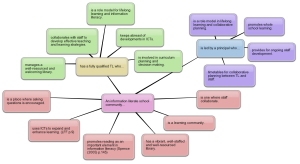I feel like I’ve been studying teacher librarianship for months rather than just two weeks. The first topic has been a brilliant introduction to the course, filling my head with ideas, questions and challenges. I can’t wait to go and pick the brains of practising TLs to see how they actually work and why.
Lundin (1981) gave a clear overview of the history of school libraries in Australia and what had been learned from experience. An overwhelming message that reappeared in all the literature was the necessity of a properly trained TL to maximise the potential of the library and to positively influence learning outcomes. I liked Lundin’s discussion of ‘readiness’ in relation to appropriate spending of grants. The research showed that “in some schools the principal and teachers recognised the need for change, a library and increased collection of resources, and they had the knowledge, expertise and plans for spending the money; in other schools this was not the case.” (p.18) When I worked part time in a school library, prior to any training, I was extremely grateful that I was not required to make any budgetary decisions. Even then I recognised that I had no idea of the bigger picture and what to prioritise in spending. I probably would have bought lots of books. I would have rightly been classed as ‘unready’! It is slightly alarming to think of the number of school libraries that are staffed by unqualified people who are finding their way by trial and error. I’m sure a lot of money is being wasted in this way.
Resource based learning (RBL) is discussed by Hazell (1990) and wonderfully explicitly by Carol-Ann Haycock (1991). It is a concept that I’m familiar with from my uni days back in the 80s. We studied constructivism, especially in relation to learning maths, and we struggled to implement it in pracs with classes that were more used to direct teaching. I remember a particularly chaotic lesson where MAB ones were being hurled around the room while the 6 year olds ran wild. I’m glad those days are past. Teaching unfamiliar children with unfamiliar methods is challenging to say the least.
I have since implemented something probably closer to resource-based teaching (RBT) in my own classrooms. I believe that setting children up to work independently not only allows the students more freedom to learn in their own way but also gives the teacher time to work with individuals and small groups when they need more support. It does require a tolerance for a more noisy classroom but I believe that you can tell the difference between constructive noise and all out chaos.
Herring’s (2007) chapter is a comprehensive discussion of all things relevant to the TL. I wish I’d read it when I’d been working in the library to help me attain that elusive ‘big picture’. The only point I would take issue with is his query about the prominence given to reading for pleasure in school library mission statements. I strongly believe it should remain prominent. Reading is the key skill we need to come out of school with – it is the first step to literacy of any kind. Teaching children to read should not be something done early on and then finished with. It must be encouraged continually right through school and into adulthood to help create well-informed, empathetic, worldly individuals. If students discover the joy of reading and pursue it for its own intrinsic value, it makes all other learning through reading so much easier. It may be ‘old school’ but it’s a fine school!
